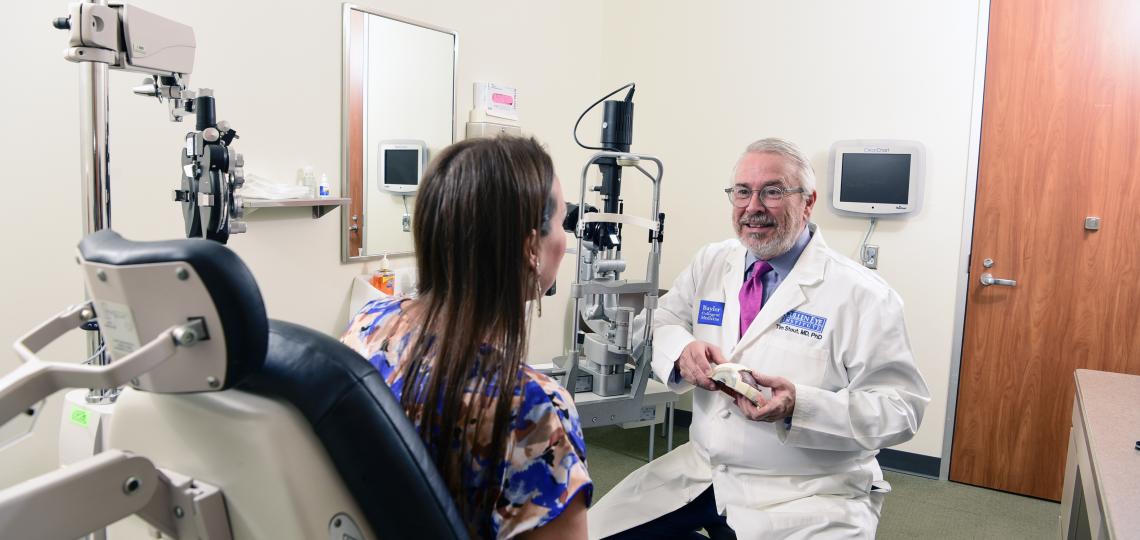Optometrist in Andalusia: Trusted Professionals for Vision Health
Optometrist in Andalusia: Trusted Professionals for Vision Health
Blog Article
Is Refractive Surgery Right for You? Factors to Consider for Better Eyecare
In the realm of eye treatment, the decision to undertake refractive surgical procedure is a substantial one that requires thoughtful consideration. From the intricacies of one's ocular health to the complexities of individual expectations and daily habits, each element holds significance in the more comprehensive landscape of refractive surgery candidacy.
Eye Health Evaluation
When thinking about refractive surgical treatment, a comprehensive eye health analysis is crucial to evaluate the viability of the procedure for each and every individual. eye doctors in andalusia. This evaluation entails a collection of exams and tests carried out by an eye care expert to figure out the overall health of the eyes, the visibility of any hidden conditions, and the stability of the refractive mistake
Throughout the evaluation, numerous factors are considered, such as the person's case history, current eye prescription, corneal thickness, student size, and tear movie quality. These evaluations help to identify any contraindications to refractive surgery, such as corneal abnormalities, cataracts, or neglected eye infections. Furthermore, the assessment assists to take care of patient assumptions pertaining to the possible outcomes of the surgery based on their unique eye characteristics.
Ultimately, the eye wellness examination is essential in making certain the safety and effectiveness of refractive surgical treatment, as it provides beneficial understandings right into the individual's eye health status and helps identify the most suitable treatment alternatives for attaining ideal visual outcomes. (andalusia pediatrics)
Way Of Life Assessment
A detailed way of living analysis is integral in establishing the viability of refractive surgical procedure for an individual's aesthetic modification demands. Way of living aspects such as occupation, pastimes, and day-to-day tasks play a critical role in the decision-making process concerning refractive surgical treatment.
Additionally, way of living habits such as sporting activities involvement, outside activities, or even skin care regimens can influence the healing process and overall success of refractive surgery. By conducting a thorough way of life assessment, eye care specialists can tailor their recommendations and therapy strategies to meet the one-of-a-kind needs of each client, inevitably leading to boosted visual results and satisfaction.
Assumption Alignment

Establishing sensible expectations entails thorough pre-operative discussions in between the patient and the eye doctor. The surgeon should transparently interact the prospective risks, benefits, and restrictions of the procedure (cardiologist andalusia). Individuals require to understand that while lots of individuals achieve 20/20 vision or much better complying with refractive surgery, some might still call for glasses for sure tasks like reading or driving at evening. Taking care of these expectations assists avoid disappointment and dissatisfaction post-surgery, leading to a much more positive general experience for the visit this website patient.
Risk Evaluation

Elements that may increase the danger of difficulties consist of age, specific clinical conditions like autoimmune diseases, unpredictable vision prescription, thin corneas, and unrealistic individual assumptions. Furthermore, selecting a competent and experienced doctor, following pre and post-operative treatment directions diligently, and divulging any kind of appropriate case history can assist alleviate threats.
To reduce the possibility of issues, eye doctors carry out extensive pre-operative examinations to identify any type of contraindications to surgical treatment. They also talk about the potential threats and benefits with clients during the examination process. By involving in open interaction and shared decision-making, both the ophthalmologist and the person can interact to determine if refractive surgical treatment is the right selection based upon specific danger profiles and preferred end results.
Examination Significance
Taking into consideration the crucial duty of notified decision-making in assessing threats and possible difficulties in refractive surgical procedure, the appointment process holds considerable value in assisting patients in the direction of ideal results. During the assessment, the eye doctor reviews the patient's eye health and wellness, refractive errors, and general viability for surgical treatment. This first analysis is essential in identifying one of the most suitable procedure for each individual, considering elements such as corneal density, student size, and existing eye problems.
Additionally, the examination functions as an opportunity for people to review their expectations, concerns, and any type of inquiries they may have regarding the surgical treatment. Clear interaction in between the patient and the doctor is necessary to make certain practical expectations and a thorough understanding of the potential dangers and benefits involved.
Additionally, the appointment enables the doctor to discuss the various surgical alternatives offered, their corresponding end results, and the post-operative treatment needed. This detailed conversation empowers clients to make well-informed decisions regarding their eye treatment, leading to far better fulfillment and results post-surgery.
Verdict
In final thought, people thinking about refractive surgery needs to go through a detailed eye health analysis, analyze their way of life practices, straighten their assumptions with potential results, analyze the associated risks, and prioritize assessments with eye care professionals. These factors play a critical function in establishing the viability of these details refractive surgical procedure for each person, guaranteeing ideal results and fulfillment with the treatment.
Clients thinking about refractive surgery often have high assumptions relating to the end results, expecting excellent vision without the demand for glasses or get in touch with lenses. While refractive surgery can significantly improve vision and decrease dependence on aesthetic aids, it is essential for clients to recognize that results may differ based on specific variables such as the level of refractive error, corneal density, and overall eye wellness.
By engaging in open interaction and shared decision-making, both the eye doctor and the person can work together to establish if refractive surgical procedure is the ideal choice based on specific danger profiles and wanted end results.
Taking into consideration the essential duty of notified decision-making in examining dangers and potential complications in refractive surgery, the assessment process holds considerable value in directing people towards optimum end results. During the assessment, the ophthalmologist examines the individual's eye health, refractive errors, and general viability for surgical treatment.
Report this page